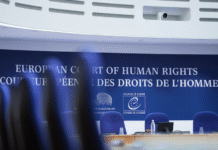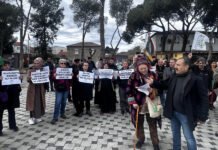The British Parliament’s Foreign Affairs Committee (FCO) has stated on early Saturday that there was no hard evidence to prove that Fethullah Gülen or the Gülen movement masterminded Turkey’s failed coup as alleged by the Turkish government. The report went on to say that ‘[w]hile there is evidence to indicate that some individual Gülenists were involved, it is mostly anecdotal or circumstantial, sometimes premised on information from confessions or informants, and is—so far—inconclusive in relation to the organisation as a whole or its leadership.’
UK Parliament’s Foreign Affairs Committee released a report titled ‘The UK’s relations with Turkey.’ According to the report the FCO did not have evidence to justify the designation of the followers of the Gülen movement as a ‘terrorist organization’ by the UK, and the Committee agrees with this assessment.
FCO has also stated that the UK was right to support Turkey against the threat posed by the coup attempt. However, actions undertaken by the Turkish government under its current State of Emergency undermine democratic culture and human rights in Turkey. In the effort to secure its wider interests, the UK risks being perceived as deprioritizing its own values in human rights.
The Foreign Affairs Committee has also affirmed the importance of Turkey as an international partner for the UK, but raises concerns about the weakening of both democracy and human rights in the country as the UK moves to strengthen the bilateral relationship.
According to FCO report, Turkey is a central regional power and its choices will dictate whether the region has a path to security and stability or otherwise. There is an obvious common interest both in the fight against ISIL and support for refugees, but also in the wider restoration of regional stability. “However,” the report said “Turkey comes with its own domestic challenges.”
Reminding that the coup attempt of July 15, 2016 was an attack against Turkey’s democracy, condemned by the UK Government, the report stated that “Through prompt displays of solidarity, the FCO ensured that the UK was seen by Turkey’s leadership as a friend and close ally of the Turkish people.”
The report continued as follow: “But, despite the FCO’s repeated emphasis on the distinctive “understanding” shown to Turkey, the Department knows too little about the Gülenists – who the Turkish government exclusively blames – and their role in the coup attempt. The FCO seemed broadly willing to take the Turkish government’s account at face value and seemed unable to offer an independent analysis.
“The UK was right to support Turkey against the threat posed by the coup attempt. However, actions undertaken by the Turkish government under its current State of Emergency undermine democratic culture and human rights in Turkey. In the effort to secure its wider interests, the UK risks being perceived as deprioritizing its own values in human rights. Despite the scale of the threat faced by Turkey, the Committee concluded that the Turkish government’s response has been disproportionate.”
Reminded in the report that they visited Turkey in January 2017 and put questions to the senior political leadership, including Turkey’s autocratic President Recep Tayyip Erdoğan and it heard from a wide range of activists, journalists, and analysts – as well as business leaders and young Turkish citizens, FCO stated that “There is an intolerance of alternative narratives in Turkey, with the Turkish government broadly suppressing, discrediting, or punishing those who contradict its authorized accounts of sensitive events.”
According to the FCO, the powers afforded by the State of Emergency—combined with a vaguely-framed definition of terrorism, a pliant media, and a politicized judiciary—have allowed the government to silence a broad spectrum of critics by labelling them as “Gülenists” or “terrorists” on the basis of light evidence or broad interpretations.
“While the Committee supports the British Government’s effort to win itself a voice to help deliver a positive future for Turkey, it must not forget its responsibilities to promote our democratic values. And therefore it recommends that Turkey is listed as a Human Rights Priority country,” said in the FCO report.
Chair of the Foreign Affairs Committee, MP Crispin Blunt, has also commented that “Turkey is an important strategic partner facing a volatile period. It needs and deserves our support, but that support needs to include our critique where Turkish policy is not in its own, or our joint long-term interests: these are regional security and stability as well as strong and accountable institutions in Turkey.
“The current purges by the Turkish government amount to a root-and-branch attempt to eradicate the Gülenist movement from positions of public influence, but they have also extended beyond that to affect opposition and pro-Kurdish activists.
“Large numbers have been punished on the basis of a broad and vague definition of ‘terrorism’ and a worryingly low threshold of evidence. Many of those dismissed and detained have been punished without trial or access to the evidence against them. There are alarmingly inadequate avenues for redress.
“These purges risk undermining Turkey’s reputation, its economy, the UK’s ability to trade there, and the capabilities of the Turkish military against shared enemies such as ISIL. More fundamentally, they undermine the values of human rights and democracy in Turkey, already significantly weakened before the coup.
“We met President Erdoğan during our visit, and he has made himself as central to twenty-first century Turkey as Mustafa Kemal Atatürk was in the twentieth century. But now is a profound moment of decision for him and his divided country. Whether he secures an executive presidency or not, the choices that President Erdoğan now makes will determine whether Turkey will be a repressive or a recovering state. Avoiding catastrophe, and instead shaping a positive outcome, is clearly in the interest of the UK’s economy, security, and values.
“The FCO must help Turkey reinforce accountable state institutions, while also developing ties far beyond them: the UK needs a deeper and therefore more durable relationship with the Turkish people, whichever background they hold, while working to uphold the values of human rights and democracy that benefit them all.”
As a first reaction from the Turkish government to the report, Turkey’s EU Minister Ömer Çelik said the government’s views are disregarded in such reports. “In such reports, either our views are not taken, or they are taken but disregarded, and a one-sided report is written,” Çelik said on Saturday.
The UK Parliament statement came a week after Germany rejected Erdoğan and the Turkish government’s accusations against the Gülen movement about July 15.
Last week the head of Germany’s Federal Intelligence Service (BND), Bruno Kahl, said Turkey could not convince them that US-based Turkish-Islamic scholar Gülen was behind a failed coup attempt on July 15.
Similarly, Devin Nunes, chairman of United States House Permanent Select Committee on Intelligence, said he has not seen any evidence showing Gülen’s involvement in the failed coup attempt in Turkey.
March 25, 2017















